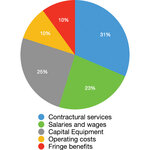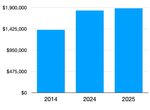By Cam Gordon
Reactions to Mayor Jacob Frey’s recommended 2025 budget for Minneapolis may be varied but concerns about costs and taxes are rising to the top.
His proposal, which was released on Aug. 14, recommends increasing the budget to $1.88 billion and the total property taxes the city may collect (or levy for) by 8.1%, despite the mayor and council approval last year to cap it at 6.1% for 2025.
The property tax levy represents roughly 25% of the revenue the city receives and includes amounts for the Minneapolis Park & Recreation Board (MPRB), the Municipal Building Commission, and the Minneapolis Public Housing Authority. Revenue from fees, fines, permits, and federal and state aid account for the remaining 75%.
Even with that increase in property taxes, Frey is proposing to use $19 million in reserve funds to cover planned expenses that will not be covered by revenue.
For reference, the 2024 council adopted budget was $1.83 billion, a 10.56% increase from the 2023 adopted budget of $1.66 billion. Ten years ago, in 2014, it was $1.4 billion.
“We will be having a lively budget discussion before us in the coming months,” said Ward 12 Council Member Aurin Chowdhury. “Now is the time for citizens to really pay attention and advocate for what they would like to see as I and other council members consider changes.”
“I know maintaining or decreasing the projected levy is a priority for Ward 11 residents,” said Ward 11 Council Member Emily Koski. “I plan to work diligently over the next few months before the budget adoption in December to explore that possibility and ensure your priorities are reflected.”
Koski encourages people to see how the property tax may impact you by visiting the “Payable 2025 Levy Impact Estimator” on the city’s website. “The median annual property tax increase for homeowners in Ward 11,” she noted, “is just under $300.”
RESIDENCES SHOULDERING MORE OF BILL AS COMMERCIAL PROPERTY VALUES DECREASE
Impacts also vary from property to property depending on their values and classification as industrial, commercial, residential or “multi-family” residential properties. A decrease in commercial property values this year will result in more of the tax burden falling on residential property owners and renters.
According to the city, most residential and commercial property values declined in 2024, with a larger decrease in commercial property values. Because of that, even with no increase in the levy, a homeowner with a median valued home would see a $36 increase in property taxes for the year. The recommended increase of 8.1% will result in an annual increase of about $207 to that hypothetical “median homeowner.”
The city’s Board of Estimate and Taxation (BET) is the entity that sets the maximum levy, and it is unclear if it will support the mayor’s request when it members take their vote on it on Sept. 18, following a public hearing on Sept. 11. It members include the mayor, council president, chair of the council’s budget committee, an MPRB commissioner and two members elected by the voters.
Steve Brandt, one of the directly-elected members and president of the BET, weighed into the issue with an opinion piece in the Star Tribune newspaper two days before the mayor’s budget address. He worries about what he called “nasty” property tax increases projected for the coming years.
Brandt wants the city to explore other revenue sources, including more state aid, better use of the downtown asset fund and sales taxes, which he thinks could be used to finance the downtown 1st precinct police station. He said that census data he has researched indicates that 24,000 households in the city have incomes at or over $200,000 and that a 1% tax on that could raise $40 million. Any local income, wealth or payroll tax would require a change to state law. Currently the city is not allowed to collect payroll or income taxes.
“I haven’t decided how I am going to vote on the mayor’s proposal,” said Brandt after seeing the recommended budget and levy increase. “I see things in there that could be cut.”
He identified possible cuts in the $1.4 million for vibrant store fronts, $1.15 million for the Coyles Center, and money to implement the consent decree, including $400,000 for data improvements and $600,000 for training. “The consent decree hasn’t even been signed yet,” he noted.
WARD 11 WILL SEE 10.68%,
WARD 12 WILL SEE 12.32%
In some areas, and for some homes, the increase in property taxes will be more than 8.1%, due to increases in assessed value. For example, the taxes on the median assessed home in Ward 12 will increase by 10.68% and in Ward 11 it will go up by 12.32%. The greatest increase will be in the northside’s Ward 4 at 16%.
City officials have estimated that with the proposed levy increase the median homeowner will pay $2,098 in 2025. Of that, $459 (or 21.7%) will go to the police department, $364 (17%) to parks, $267 (12.7%) for debt service and infrastructure, $172 (8.2%) to the fire department, $151 (7.1%) to the public works department, $21 (1%) for public housing, and $598 (28.5%) to be divided among the estimated 21 remaining departments.
In his budget address the mayor highlighted investments in affordable housing, downtown revitalization, public safety, economic development, and climate action. He proposed spending approximately $16 million in 2024 to comply with the legal settlements related to state and federal findings of unconstitutional and discriminatory policing practices. This includes 13 additional positions in information technology and the police department, improvements in police precincts and a new wellness and training facility for MPD.
“I appreciate his attention to these important topics, and I will continue to advocate for Ward 11’s budget priorities throughout the city council’s deliberations and considerations,” said Koski, “including prioritizing funding for the neighborhood traffic calming program, as well as auto-theft deterrence and prevention.”
In June, the city council formally approved budget priorities and forwarded them to the mayor for consideration. It is unclear if, and what, council priorities are reflected the budget. Koski’s first priority, to maintain or lower the levy, was not. Neither was Ward 2 Council Member Robin Wonsley’s priority for additional city council policy staff to “ensure the council has access to subject matter experts.”
Among the southside council members, Ward 8 Council Member Andrea Jenkin’s prioritized funding for “38th Street Thrive, George Floyd Square,” and “Pillsbury Creative Commons.”
Ward 9’s Jason Chavez’s priorities included AVIVO Village, Tamales y Bicicletas, the Latino Center for Community Engagement, Lake Street safety ambassadors, Muslim Youth and Family Services for community safety and youth programming and Next Step, the hospital-based support for victims of violent injuries initiative.
In addition to maintaining or lowering the levy, Koski also prioritized funds for police recruitment, hiring, and retention, as well as for auto theft deterrence, traffic calming, a small business labor standards project, fire station alerting systems, affordable homeownership grants, and for an enterprise resource planning project.
Ward 12’s Chowdhury prioritized transit safety coordinators, neighborhood associations, zero waste initiatives, small business support during road work, funds for public health needs related to homelessness, and traffic calming.
“I am viewing this proposed levy increase as a starting point,” said Koski, “and hope to successfully work in partnership with my council colleagues and the mayor to identify some additional places to trim down on spending.”
“It is my goal to ensure that our budget reflects the values and needs of the constituents we serve,” said Chowdhury. ”I am hopeful to see priorities around support for seniors, traffic calming, transit safety, and addressing unsheltered homelessness within this budget while working to see if this council can help lower the mayor’s proposed levy increase.”


Comments
No comments on this item Please log in to comment by clicking here